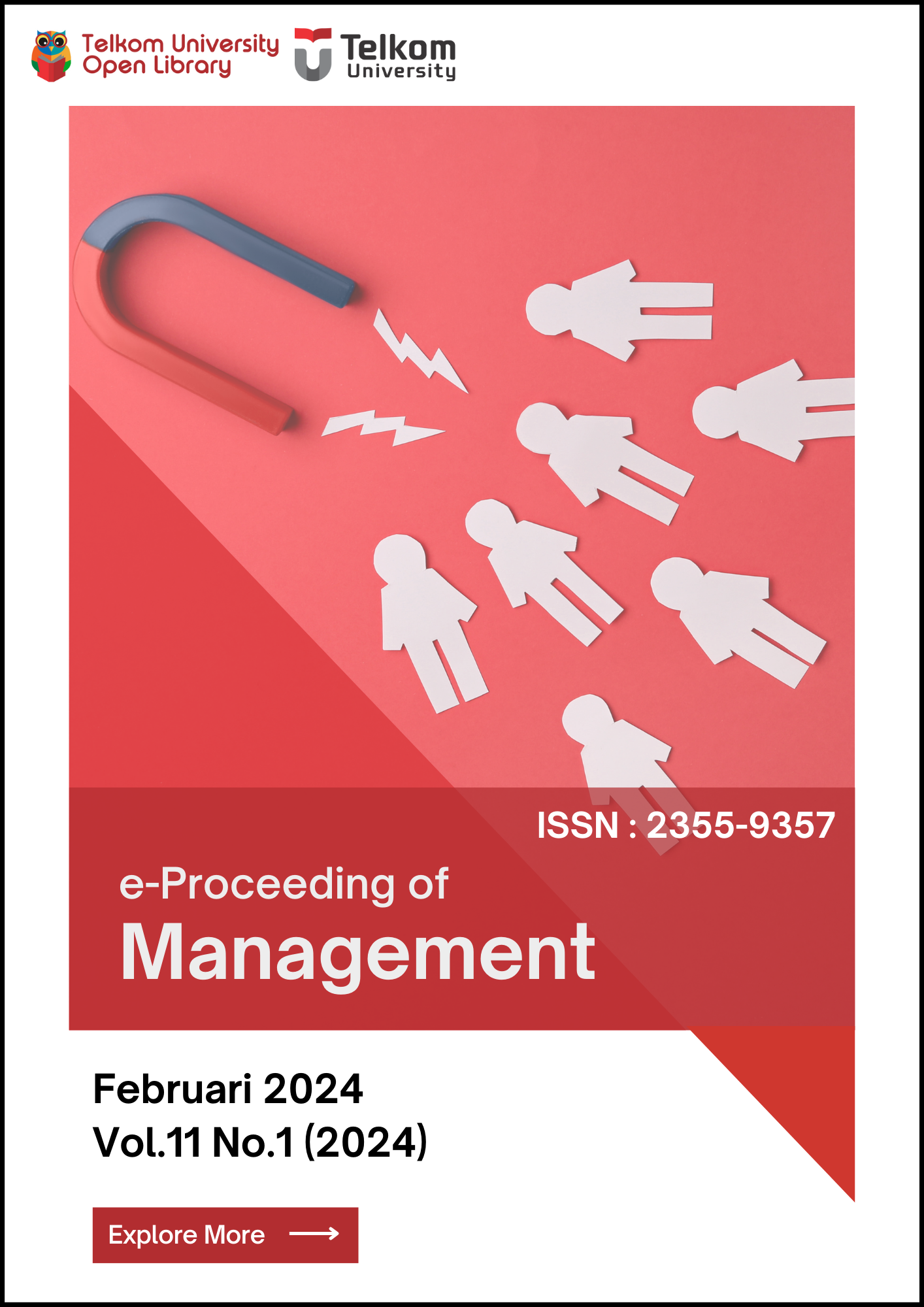Measuring The Influence Of Social Awareness Campaign On Achieving Sustainable Development Goal 11.6 Waste Management: A Quantitative Study On Food Waste At Jakarta Culinary Center
Abstract
Penelitian ini menyelidiki tingkat paparan kampanye kesadaran sosial, pengetahuan tentang pengelolaan sampah makanan yang berkelanjutan, sikap terhadap pengurangan sampah makanan, dan perilaku konkret dalam pengelolaan sampah makanan di antara para peserta. Data dikumpulkan melalui survei yang dilaksanakan di Jakarta Culinary Center, dengan pengujian validitas dan reliabilitas yang ketat untuk memastikan integritas data. Metode kuantitatif dipilih oleh peneliti dalam penelitian ini karena data yang diolah berupa angka-angka yang nantinya akan diolah untuk mendapatkan hasil penelitian. Dengan menggunakan teknik statistik, termasuk analisis regresi dan korelasi dalam SPSS, penelitian ini bertujuan untuk mencapai empat tujuan utama: 1) mengukur pengaruh kampanye terhadap peningkatan pengetahuan peserta tentang pengelolaan sampah makanan berkelanjutan, 2) menganalisis bagaimana persepsi peserta terhadap efektivitas kampanye mempengaruhi sikap mereka terhadap pengurangan sampah makanan, 3) mengevaluasi korelasi antara paparan kampanye dan perilaku konkret peserta dalam pengelolaan sampah makanan berkelanjutan. Temuan dari penelitian ini: 1) Kami telah mengamati hubungan positif yang signifikan antara tingkat paparan kampanye kesadaran sosial dan peningkatan pengetahuan peserta tentang pengelolaan sampah makanan yang berkelanjutan, 2) Kampanye ini tidak hanya memberikan informasi tetapi juga berhasil mempengaruhi sikap individu secara positif, mendorong pendekatan yang lebih teliti terhadap sampah makanan, 3) Kami telah membangun hubungan positif yang patut diperhatikan antara tingkat paparan kampanye kesadaran sosial dan perilaku konkret peserta dalam pengelolaan sampah makanan yang berkelanjutan. Kata Kunci-sustainable development goal 11.6, social awareness campaign, food waste management, culinary institutions, quantitative studyReferences
Ariyani, L., & Ririh, K. R. (2020). Understanding Behavior of Household Food Waste Management: Food Waste
Hierarchy Context. Jurnal Ilmiah Teknik Industri, 19(2), 142-154. https://doi.org/10.23917/jiti.v19i2.11994
Emas, R. (2013). The Concept of Sustainable Development: Definition and Defining Principles. Brief for GSDR 2015,
January 2015, 1-3. https://doi.org/10.13140/RG.2.2.34980.22404
FAO. (2015). Global Initiative on Food Loss and Waste Reduction.
Goossens, Y., Wegner, A., & Schmidt, T. (2019). Sustainability Assessment of Food Waste Prevention Measures:
Review of Existing Evaluation Practices. Frontiers in Sustainable Food Systems, 3(October).
https://doi.org/10.3389/fsufs.2019.00090
Goyal, A., Lock, E., Moorthy, D., & Perera, R. (2023). Saving Southeast Asia's crops: Four key steps toward food
security. McKinsey & Company. https://www.mckinsey.com/industries/agriculture/our-insights/savingsoutheast-asias-crops-four-key-steps-toward-food-security
Iranmanesh, M., Ghobakhloo, M., Nilashi, M., Tseng, M. L., Senali, M. G., & Abbasi, G. A. (2022). Impacts of the
COVID-19 pandemic on household food waste behaviour: A systematic review. In Appetite (Vol. 176).
https://doi.org/10.1016/j.appet.2022.106127
Iriyadi, Setiawan, B., & Puspitasari, R. (2023). Consumer intentions to reduce food waste in all-you-can-eat
restaurants based on personal norm activation. Heliyon, 9(2), e13399.
https://doi.org/10.1016/j.heliyon.2023.e13399
Jribi, S., Ben Ismail, H., Doggui, D., & Debbabi, H. (2020). COVID-19 virus outbreak lockdown: What impacts on
household food wastage? Environment, Development and Sustainability, 22(5), 3939-3955.
https://doi.org/10.1007/s10668-020-00740-y
Leander von Kameke. (2022). Total forecasted population in Southeast Asia in 2035, by country.
https://www.statista.com/statistics/713862/asean-forecast-total-population-by-country/
Lombardi, M., & Costantino, M. (2020). A social innovation model for reducing food waste: The case study of an
italian non-profit organization. Administrative Sciences, 10(3). https://doi.org/10.3390/admsci10030045
Ming, T. E. (2021, September 19). Covid-19 is a 8wake-up call9 to act on Southeast Asia9s food waste crisis, experts
Mulyo, J. H., Widada, A. W., Perwitasari, H., Sugiyarto, & Rohmah, F. (2022). The Effect of Food Consumption
Management on the Reduction of Food Waste in Indonesia. IOP Conference Series: Earth and Environmental
Science, 1005(1). https://doi.org/10.1088/1755-1315/1005/1/012025
OECD. (2020). Food Supply Chains and COVID-19: Impacts and Policy Lessons. In OECD Policy Responses to
Coronavirus (COVID-19) (pp. 1-11). Organisation for Economic Co-operation and Development (OECD).
https://doi.org/10.4060/ca8833en
Oosterhof, P. D. (2018). Localizing the SDGs to Accelerate Implementation of the 2030 Agenda for Sustainable
Development. The Governance Brief, 33, 3-14.
Pearson, D., & Perera, A. (2018). Reducing Food Waste: A Practitioner Guide Identifying Requirements for an
Integrated Social Marketing Communication Campaign. Social Marketing Quarterly, 24(1), 45-57.
https://doi.org/10.1177/1524500417750830
Purwanto, E., Biasini, N., Yulianto, A., Gunawan, T., & Wati, V. O. (2023). Attitude, intention, and behavior to reduce
food waste among generation X. IOP Conference Series: Earth and Environmental Science, 1168(1).
https://doi.org/10.1088/1755-1315/1168/1/012056
Sahin, E., & Gok Demir, Z. (2023). Decision Tree Analysis of Sustainable and Ethical Food Preferences of
Undergraduate Students of Gastronomy and Culinary Arts. Sustainability (Switzerland), 15(4).
https://doi.org/10.3390/su15043266
SDG. (2022). The Sustainable Development Goals Report 2022. In United Nations. https://www.unilibrary.org/content/books/9789210018098%0Ahttps://www.un-ilibrary.org/content/books/9789210478878
Sugiyono. (2018). Metode Penelitian Kuantitatif, Kualitatif, dan R&D. Alfabeta.
Sugiyono. (2019). Metode Penelitian Kuantitatif, Kualitatif dan R&D. Alfabeta.
Szakos, D., Szabo-Bodi, B., & Kasza, G. (2021). Consumer awareness campaign to reduce household food waste
based on structural equation behavior modeling in Hungary. Environmental Science and Pollution Research,
(19), 24580-24589. https://doi.org/10.1007/s11356-020-09047-x






